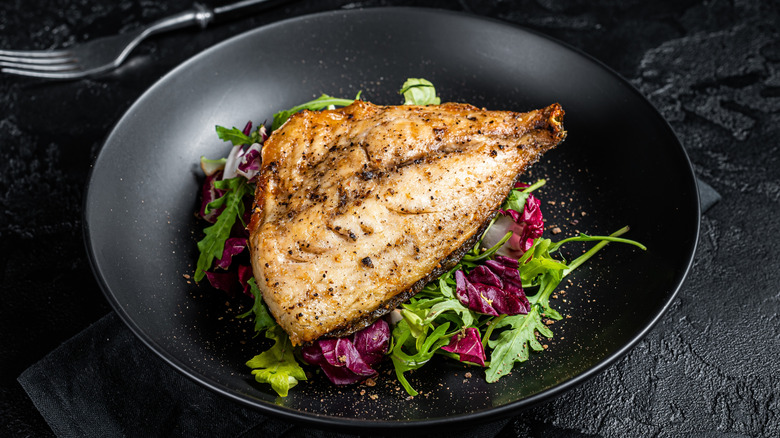Grill Better White Fish With The Simplest Possible Seasoning Tip
Sometimes less is more, and the smallest adjustments can make a big difference when grilling white fish. Tasting Table caught up with Sheila Lucero, culinary director at Big Red F Restaurant Group and executive chef at Jax Fish House & Oyster Bar and Centro Mexican Kitchen, for some tips. When talking about mahi mahi, she says, "I prefer to season by lightly rubbing oil on all sides of the filet, and seasoning with salt and pepper." The tip will apply to all white fish, however. She explained, "Mahi mahi is a bit firmer than snapper, but I handle them similarly."
Mahi mahi filets (aka dorado) are a good grilling choice precisely because they're quite firm textured. And this quick-dash seasoning approach contrasts more time-consuming hacks — like the brine-based soaking tip to enhance the flavor of freshly caught fish. The general rule of thumb is a teaspoon of seasoning per standard serving, which works out around 6 ounces of fish per person. However, go more generously than you think: Not salting enough is one of the main mistakes everyone makes when grilling fish, according to a chef. The oil carries the salt and mild spice of the pepper into the dish, simply yet effectively binding the flavors throughout the meat.
Why salt is necessary for seasoning white fish
Before scattering salt over your nice white filet of fish, it's worth learning exactly how you'll benefit. Salt is a popular cooking mineral, and you see this seasoning choice everywhere. But what does it do for grilled white fish in particular? Salt is extremely effective for tenderizing the flesh of fish and has a valuable balancing effect on the flavor. With white fish, the basic taste profile is so mild that you really do need salt and pepper as a bare minimum approach to seasoning.
White fish does sometimes get a bad rep for being a bit dull, so a quick seasoning solution is exactly what you need. With a solid flavoring base, the world is your oyster (or flounder). You can stuff whole snappers with rosemary and pair filets with four-herb gremolata, or keep things simple with grilled mahi mahi and lemon and garlic sauce. The best part is that the saline base you dashed over your fish earlier perfectly balances the flesh texture and taste for all these extra flavors.
There's not enough time to cover everything you need to know about salt, but it's easy to establish just how useful it is for the texture and flavor of white fish. Learning the difference between kosher, table, and sea salt is also worthwhile; each has varying textures and nutritional value, and all can be used to turn your grilled fish from bland to taste-bud-popping.

